What’s an hour worth to your sales team?
That hour could be used for a cold call that converts into a trial. A product demo that nudges a hesitant lead into a customer. A round of follow-up emails that bring in 10 new prospects. Or it could be spent on data entry.
Time well spent equals more deals closed. So why do most sales reps only spend ⅓ of their time actively selling?
The right sales management software keeps your sales reps organized and empowered to spend their time on work that moves the bottom line (and gives you the metrics you need to support them).
There are a ton of options out there for different sales management software tools (each with its pros and cons). So how do you know which one is right for your team?
What is Sales Management Software and Who is it Built For?
Sales management software is a type of tool that gives managers clear insights into the sales pipeline and process, streamline team activity, individual rep performance, and deal status. It enables them to quickly get the data they need to make better decisions and optimize any part of their team's sales workflow (for better sales performance and pipeline management).
This is the operating system for the modern sales team, combining key tools including a sales CRM software tool, built-in calling and email automation, lead management, and reporting. Combining these features into one space ensures that everyone—from your individual sales reps to the sales director—has the tools they need to do their best work.
9 Best Sales Management Software Solutions for Sales Teams
One of the biggest benefits of using sales management software is how it brings focus to your team. The right tool feels custom-designed to your unique workflow (rather than like trying to fit a square peg into a round hole).
Feature lists don’t tell the full story of whether a tool is right for you, especially when it comes to ease of use for your salespeople. Instead, you need to look for the option that is built with your business size, sales plan, and company needs in mind.
So which sales management software is right for you? Here’s a quick breakdown of some of the best options out there today and why they’re right (or wrong) for your company.
1. Close
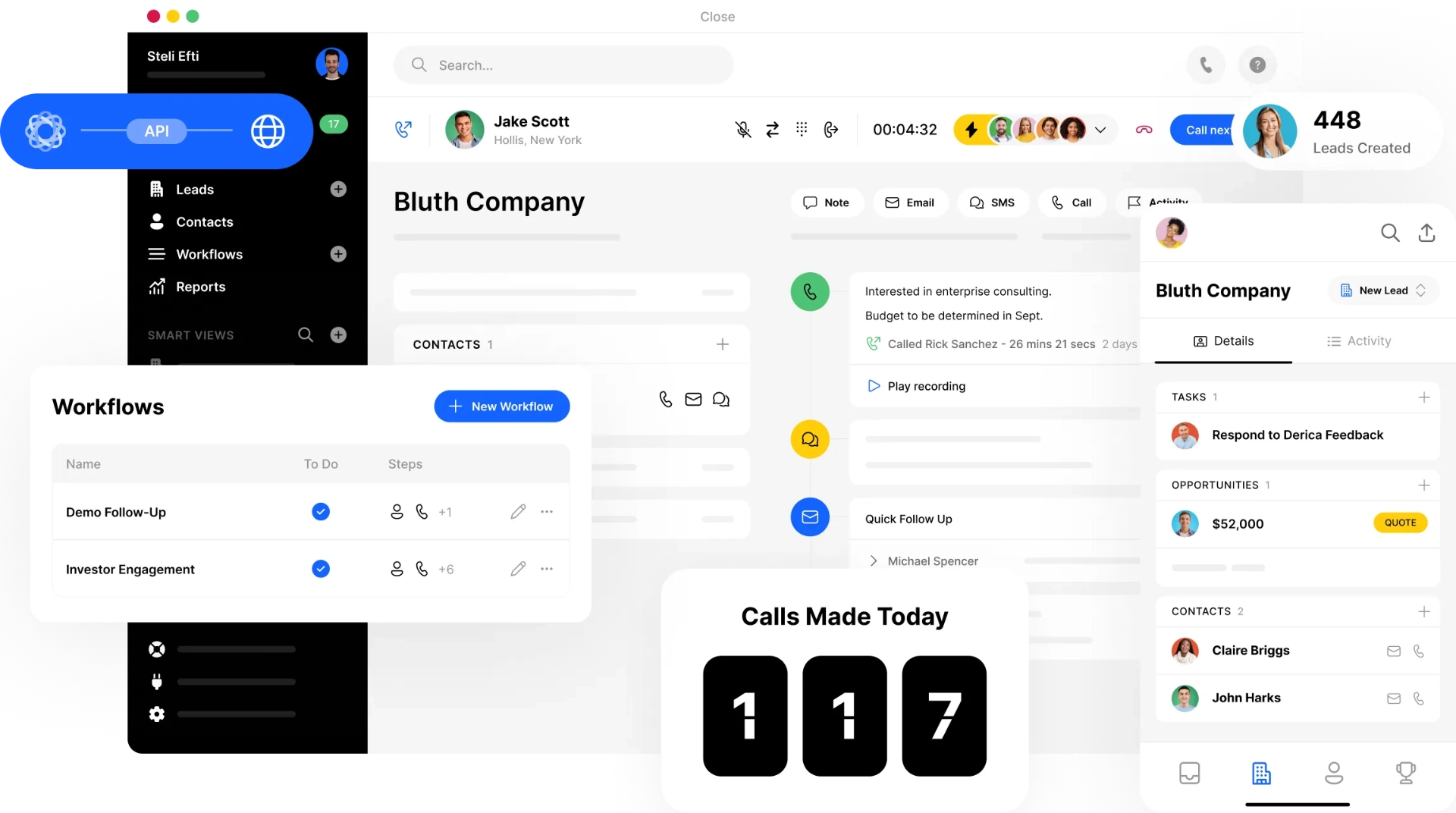
Best Feature: Seamless communication from all touchpoints, automatically recorded
Best for: SMBs, startups, and remote sales teams
We built Close to be the ultimate sales management software tool for small and medium businesses who want to close more deals in less time. This means we’ve focused on creating a clean UI that highlights the features your sales team uses every day to contact leads and close deals.
Close combines a powerful CRM with built-in calling, emailing, and automation to help speed up and improve your sales team’s productivity, and sales leaderboards to motivate your team. It also includes powerful reporting features to keep you on track to hit your sales KPIs, as well as live coaching features. If you’re a high-volume sales team focused on closing deals, Close is the tool for you.
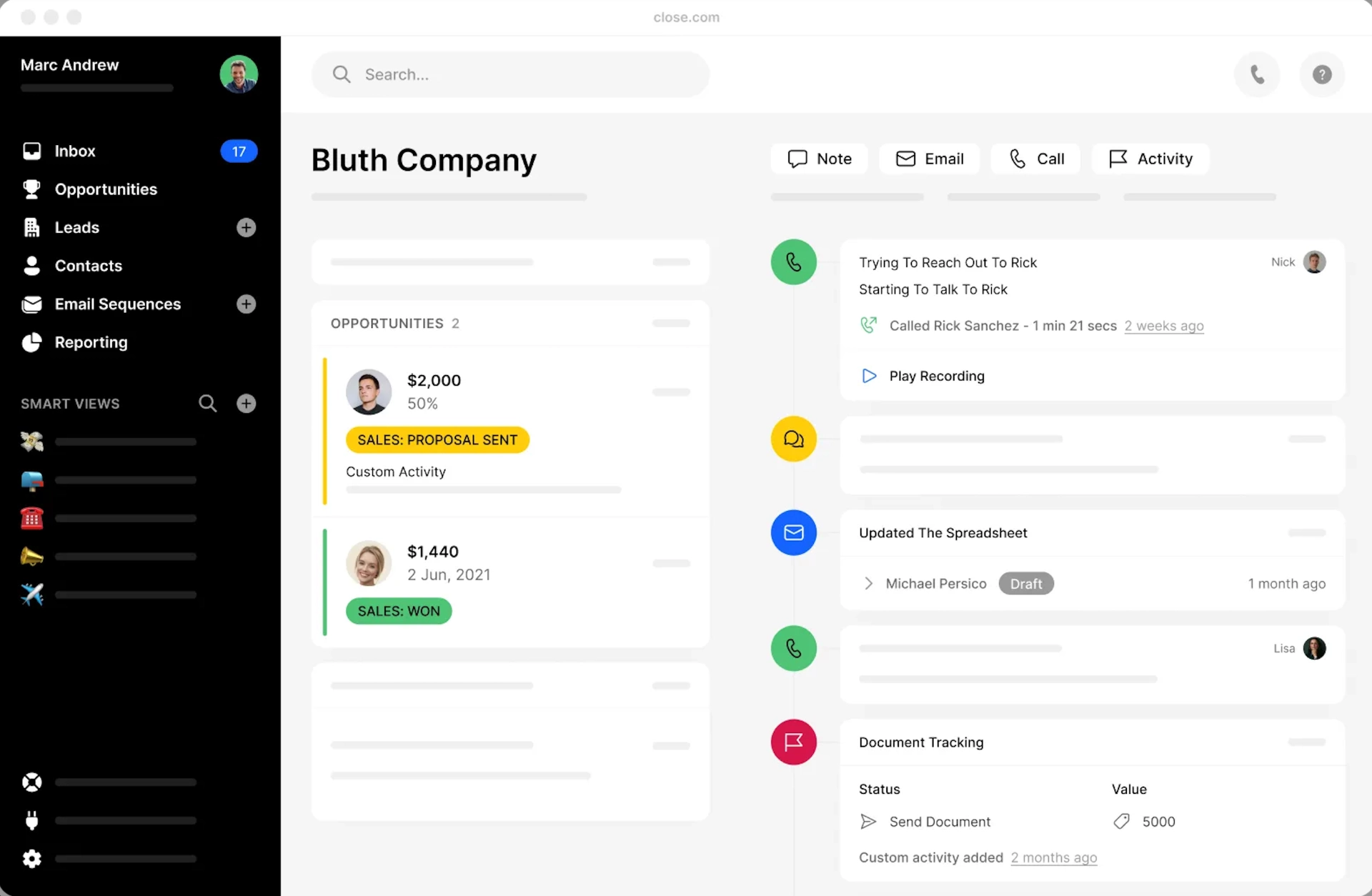
2. Pipedrive
Best Feature: Simple interface that’s easy to learn
Best for: Very small teams
Pipedrive tries to cut out the clutter and provide a simple selling experience. The software is built around a customizable pipeline that visually represents your leads as they move through your funnel.
For outreach, you’re limited to just a built-in inbox on the cheapest pricing plans, with a built-in caller only available on Professional and Enterprise plans. However, Pipedrive integrates with a number of third-party apps to bring in the functionality you need to run your sales team.
See how Pipedrive stacks up against Close.
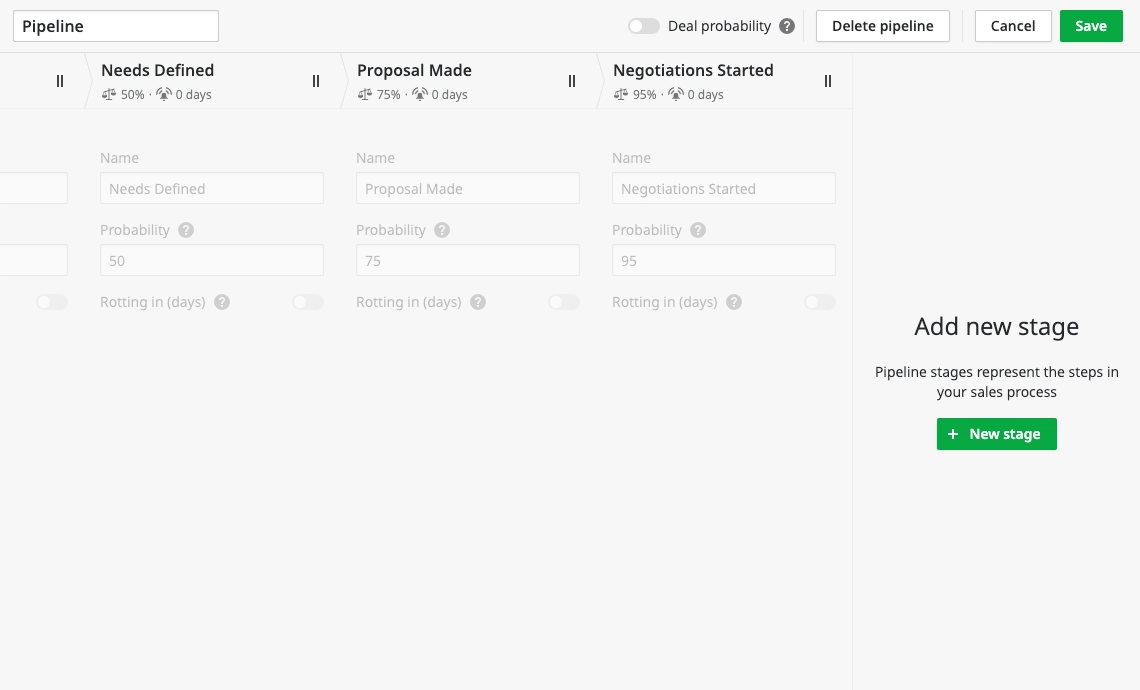
3. HubSpot
Best Feature: Integrated marketing and sales tools
Best for: Medium to large sales teams
Hubspot is one of the easiest tools to get started with, offering a free (albeit limited) CRM software sales management in small teams. In their free offering, HubSpot automatically logs your sales activities (including emails, calls, and meetings) and gives you a high-level overview of your full pipeline.
However, while it’s a good standalone CRM, it quickly becomes overly expensive (and complicated) to make HubSpot work beyond that, plus it’s considered a bit more of a marketing tool at the end of the day. With no bulk email sending or inbound calls and an expensive "setup" fee, HubSpot isn’t the best choice for dedicated or high-volume sales teams, despite having a free CRM offering that attracts a lot of early sales teams.
See how two top sales management software tools compare: HubSpot vs Close.
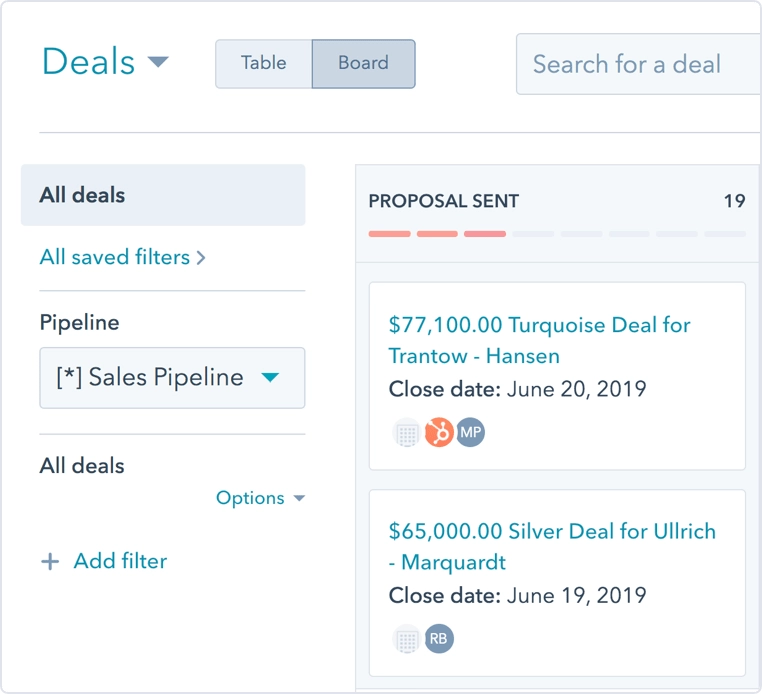
4. Salesforce
Best Feature: Powerful integrated AI features
Best for: Enterprise sales teams
It’s impossible not to mention Salesforce in any roundup of cloud-based sales management software. As a major player in the space, Salesforce provides pretty much every feature you could ever want (at a price) from calling to email to CRM to in-depth reporting and sales forecasting.
Unfortunately, after years of adding features and plans, Salesforce’s offering has become incredibly complicated and its ease of use has suffered. Pricing is complex and there are hidden costs and add-ons, even for some of the most basic features. Due to its complicated nature, you’ll most likely need weeks with a dedicated consultant to get your team up to speed and ready to work.
Check out some of the major differences when comparing Salesforce vs Close.
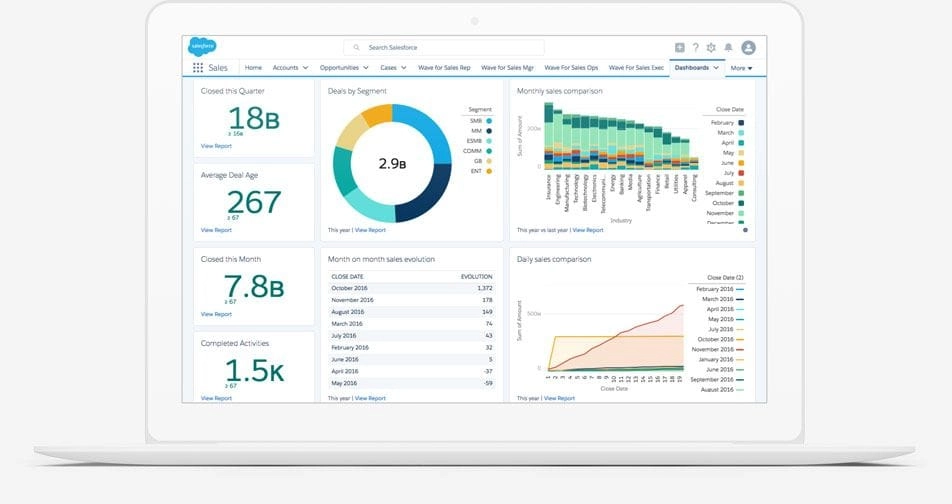
5. Salesflare
Best Feature: Automated lead detection & tracking
Best for: SMBs who sell B2B
Salesflare is an intelligent sales management tool that automates your lead tracking and makes it really easy to follow up.
Salesflare integrates closely with Gmail and Outlook as well as LinkedIn. It automatically detects leads in your inbox and calendar and then tracks these across your pipeline. It also packs email sequences, an email finder, and some other handy sales tools if you need them.
It's exclusively built for B2B sales exclusively however, so if that's not you, you better look for another software solution.
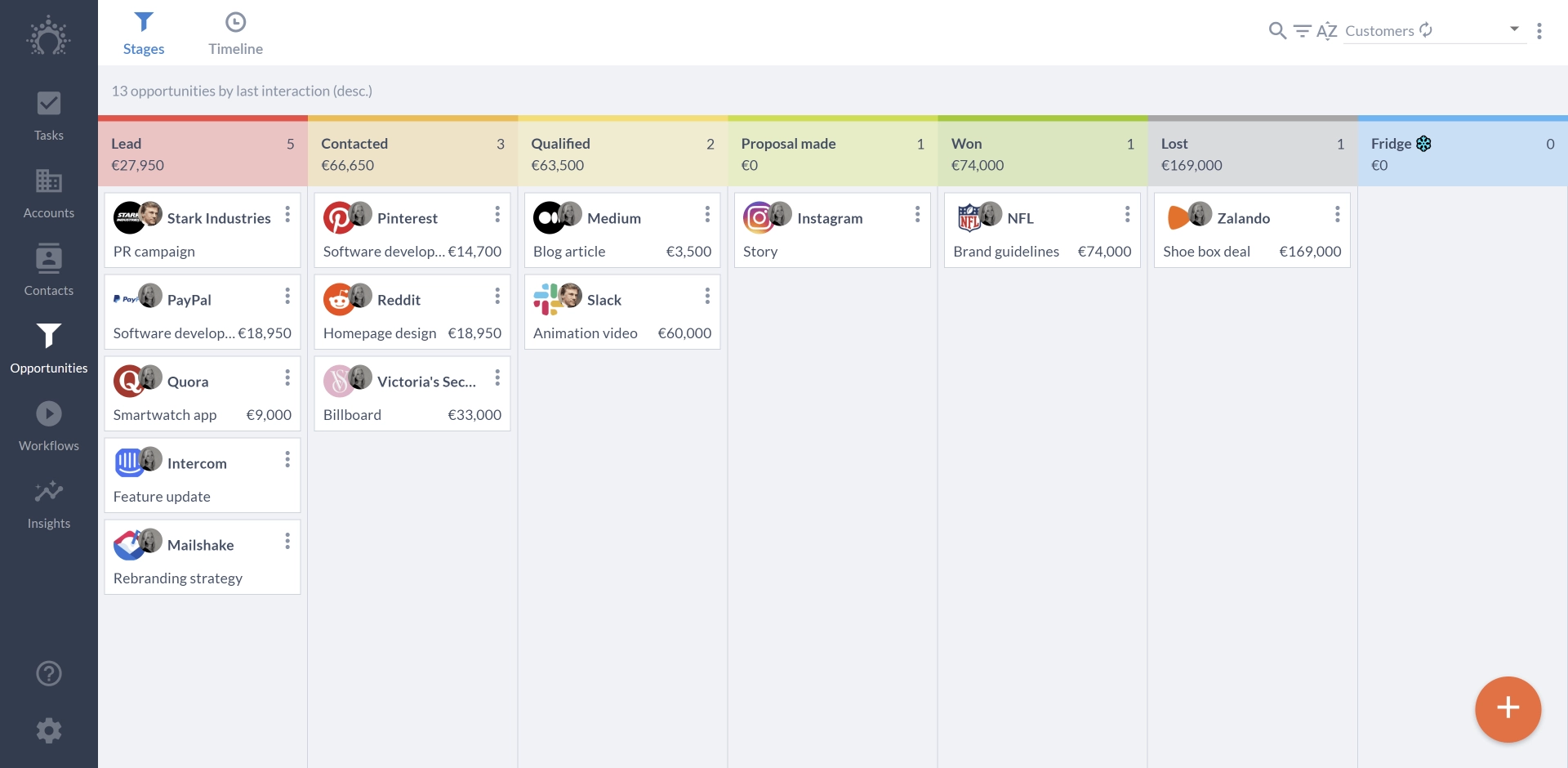
6. Freshworks
Best Feature: Integrated live chat features
Best for: This type of sales team (medium, enterprise, etc.)
Freshworks is all about leads. Their main dashboard is built around moving people through your sales funnel and displays information like demographics, social profiles, touchpoints, and notes and info on any conversations you’ve had with them.
This sales management tool is also more than just a CRM, however. Freshworks CRM integrates calling and emailing and even has some automation options that allow you to schedule emails, create templates, and follow up with your prospects. Plus, it’s built to integrate seamlessly with the entire Freshworks ecosystem, including tools for success, marketing, customer service, help desks, and more.
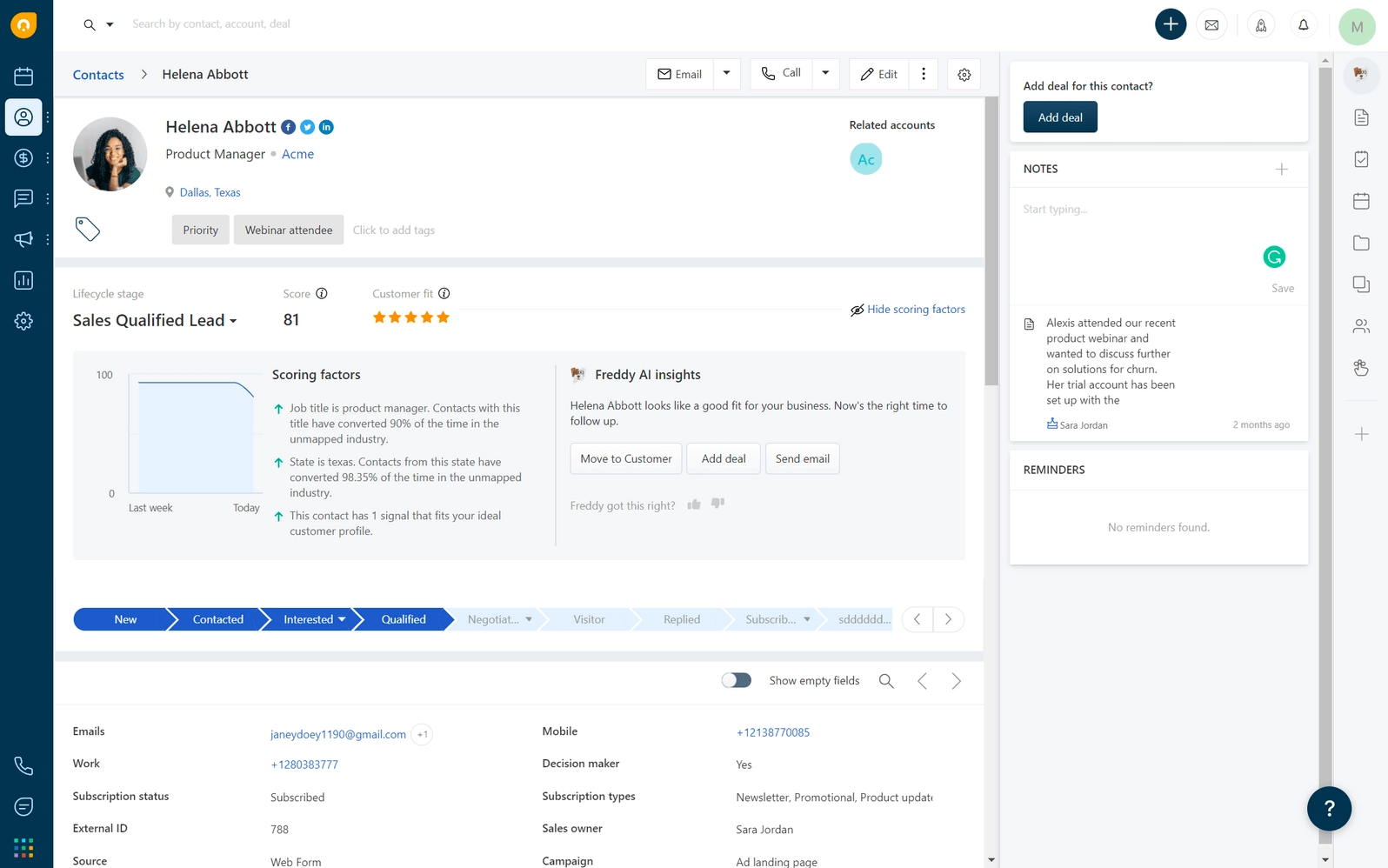
7. Ambition
Best Feature: Seamless communication from all touchpoints, automatically recorded
Best for: SMBs, startups, and remote sales teams
Ambition is a sales team management software that allows you to track your reps’ activity better and even gamifies the sales process. This product integrates with your CRM and other tools to pull rep KPIs and turns them into actionable insights for the whole team.
This is a great tool for remote sales teams that miss the buzz of the sales floor and are looking to bring that energy back to their team. Sales managers can set up dashboards, build leaderboards, generate healthy competition with sales games, develop coaching plans, create rep scorecards, and more.
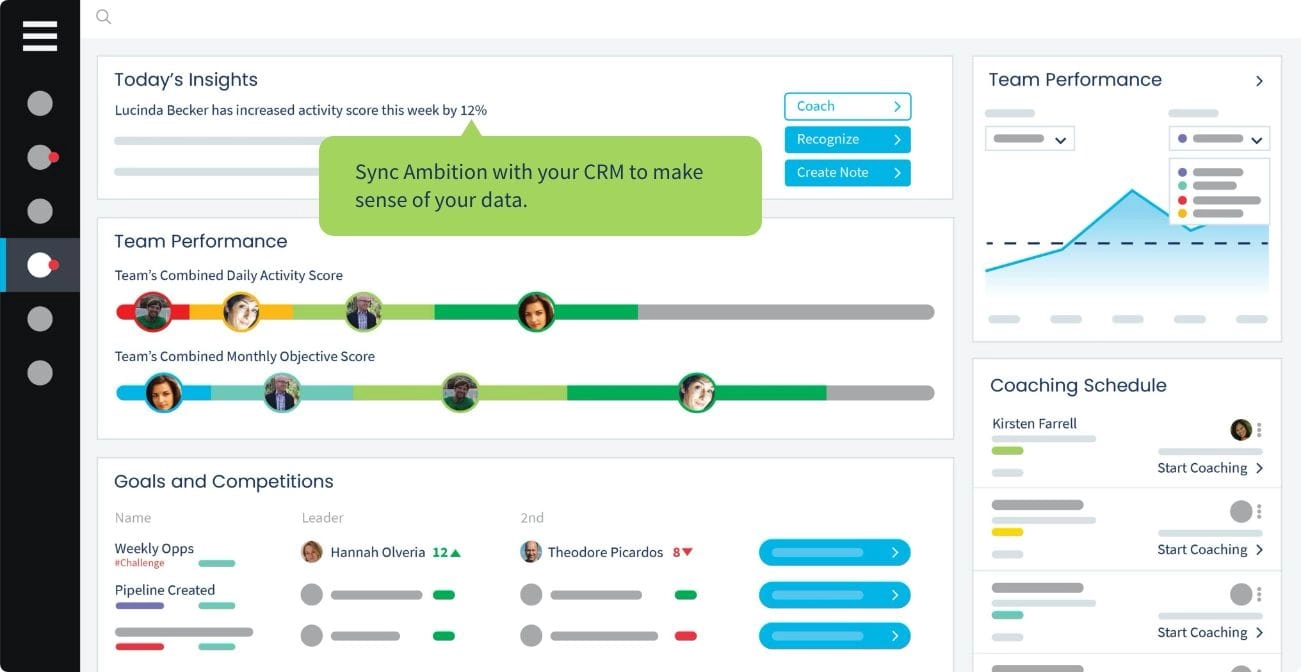
8. Copper
Best Feature: Built to work seamlessly with G Suite
Best for: Teams that are highly email-focused
Copper is a CRM that works inside your Gmail inbox, meaning the UI is easy to get started with for anyone who is currently using G Suite. Their Projects feature is also great for agencies and other teams who continue to work with clients after the deal is closed.
Where this CRM software for sales management fails to reach the bar set by its peers is with calling: there are no integrated calling features in Copper. If your sales team is heavily-focused on calling, this probably isn’t the software for you.
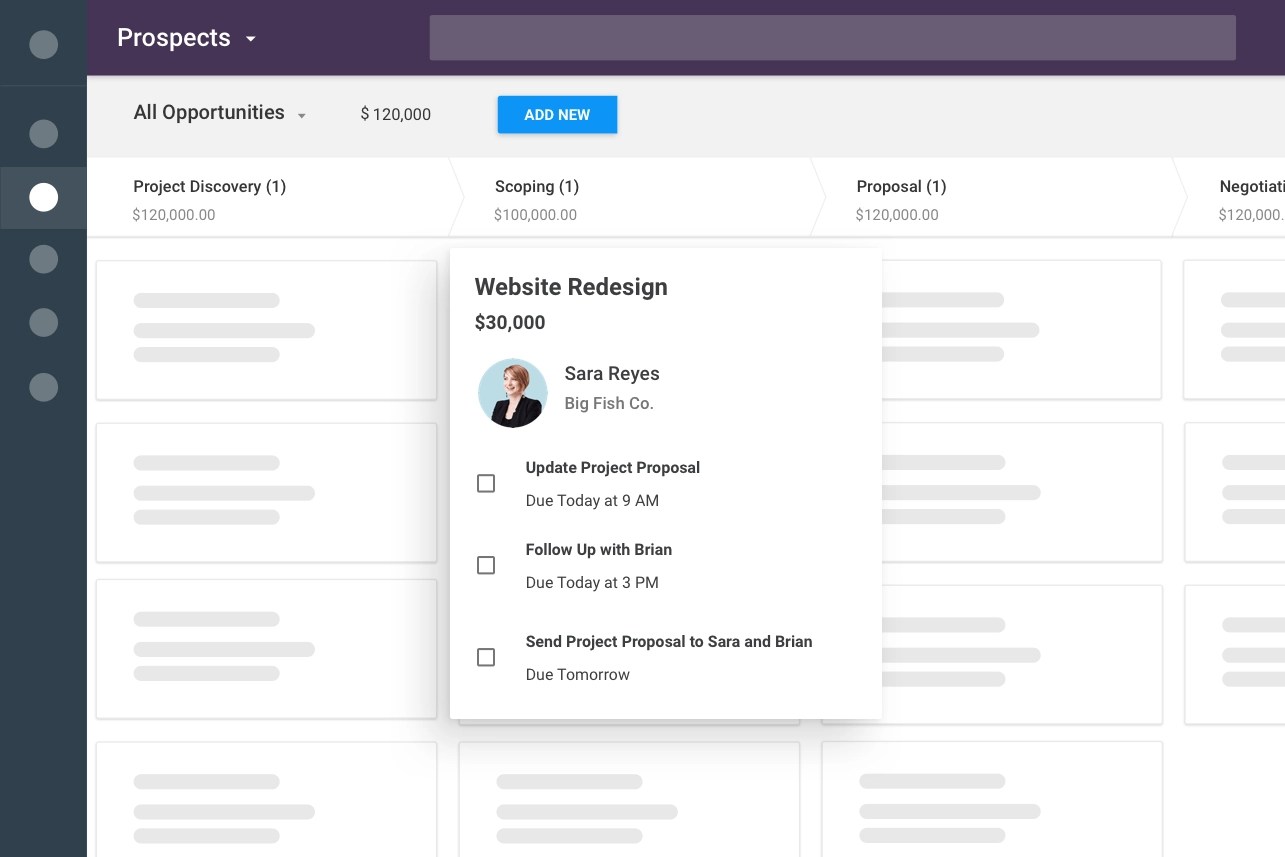
9. Troops.ai
Best Feature: Automated workflows to deliver the right data to the right people
Best for: Remote sales teams with lots of deals
This sales team management software integrates directly with your favorite CRMs and communication tools, and helps you connect the dots between your data and your team. Troops gives your team access to real-time updates and insights without switching to another window. It also allows you to automate important workflows to get more done in less time.
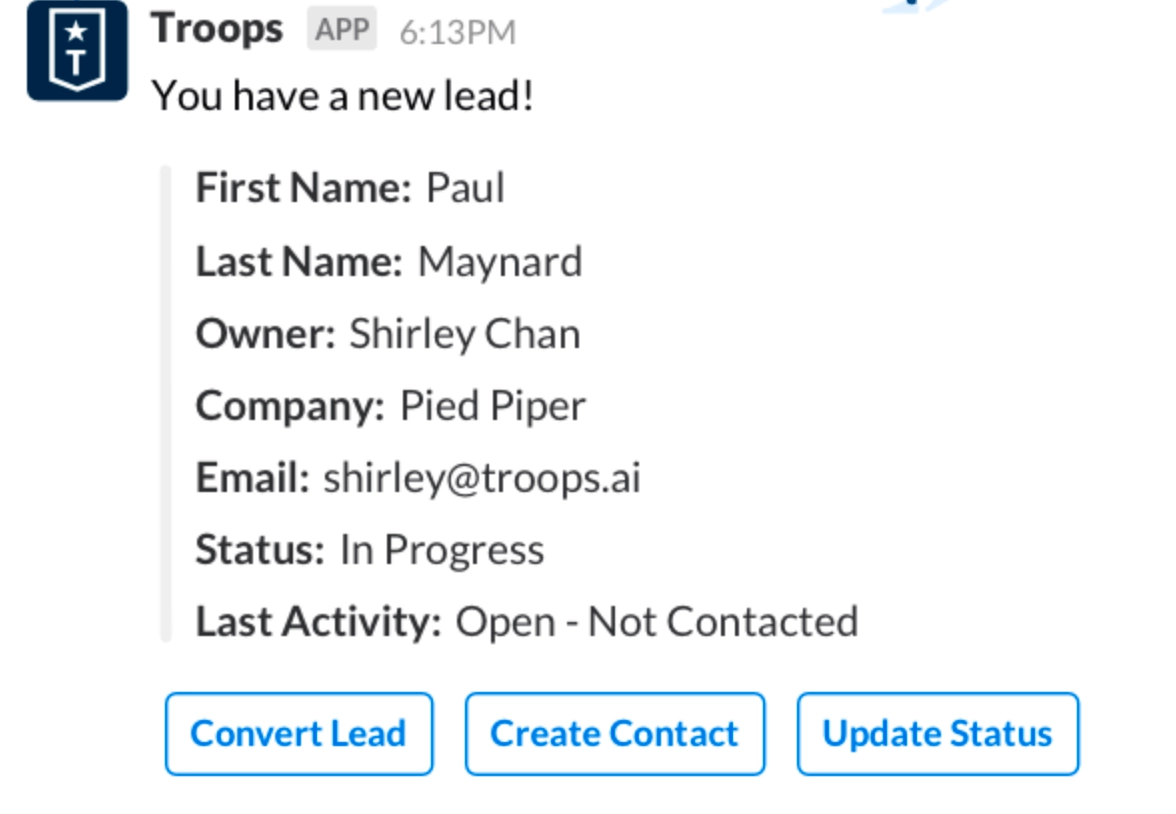
Who is Sales Management Software Used By?
Sales management software helps everyone on your sales team stay organized, focused, and up-to-speed. Don’t be fooled by the name—your whole team can benefit from this kind of software, not just the senior sales team members.
So, who uses sales team management software?
- Individual Sales Reps: Your reps use software like this to supercharge their workflows and get more done every day. This includes using a sales CRM to track customer relationships and follow up on leads, or using built-in email and calling to keep their inbound and outbound sales efforts productive, focused, and organized.
- Sales Managers: Team leads use it to get key insights into your team’s productivity and efforts. It also helps you track sales metrics and KPIs so you can stay informed and adjust your sales strategies moving forward.
- Sales Directors and Executives: The best sales teams run on data. For sales directors and executives, sales management software provides powerful reporting to help forecast future earnings, set company goals, and discover new opportunities and trends.
Which Industries Use Sales Management Software?
Pretty much any industry and niche can benefit from using it. No matter what you’re selling, you can use sales management software to be more effective and organized.
Here are some examples of how different industries use sales management software:
- SaaS: Due to the ever-changing nature of the market, software companies (especially SaaS) not only require real-time insights into sales metrics like churn, but also need to be organized around tracking leads as they move through the funnel and maintaining customer relationships.
- SMB: As a small business, good service is your silver bullet. Sales management software gives you the insight and workflows you need to stand out from the pack and show potential customers that you can compete on value (without forcing you to compete on price). It’s also a home base for all your customer relationships, including customer support and other post-sale communication.
- E-commerce: As your customers are faced with an ever-growing number of choices for shopping online, you need to be organized and proactive about keeping them engaged and coming back for more. With sales management software, eCommerce companies are able to automate their sales funnel, identify and nurture high-value leads, and find trends to help bring in repeat customers. (Plus, tools like catalog making software help you show the finer details to your audience.)
- Real estate: If your product is a once-in-a-lifetime purchase for most people, you can’t slouch on relationship-building. For realtors and firms, sales management software helps you with project management and makes sure you’re always on your client’s minds and moving them towards the sale.
- Coaching and consulting: With hundreds of customers looking for personal services, a CRM and other sales management software features are invaluable to your coaching business. Not only can you organize and track client information and communication, but you can also automate the busy work of scheduling calls and appointments.
18 Sales Management Software Features to Look For
It’s no surprise that there are plenty of options on the market when it comes to CRM software for sales management.
So, how can you decide which is right for your team?
Let’s dive into some of the essential features your next sales management tool should excel in:
Overview of Your Sales Workflow
Sales management software should feel like your personal sales headquarters. The second you open it, you should know where you are, what’s on your plate, and what needs to get done to push deals forward.
In some systems, this includes the ability to assign tasks and see a list of tasks that you need to check off, or a quick view of any incoming emails or calls that you need to respond to.
This is essential because it helps your team spend their time selling, not trying to decide what needs their attention.
Simple and Easy-to-Use CRM
Whoever understands the customer best, wins. A simple—yet powerful—CRM helps you keep track of every single prospect, lead, and customer so you can give them the best service possible.
Within CRM software for sales management, transparency is key. The right system gives you easy access to important customer data and a history of each touchpoint with the whole sales team during the sales cycle.

Only then can you provide the personalized treatment that customers today expect.
Lead & Opportunity Management Pipeline
Tracking leads and new opportunities is a must for any high-performing sales team. A practical sales management software solution will help you with lead scoring and show you the status of all your deals and opportunities in one place so you can act on them and make sure nothing slips through the cracks.
In most cases, this means having a customizable pipeline view that shows you the different stages of your sales process, and where each deal stands. This helps you see at a glance how close you are to reaching your revenue targets.
Sales Activity Monitoring & Leaderboard
Your sales growth is directly tied to your sales rep’s productivity. The more active and efficient they are, the more leads you’ll bring in.
Your sales tracking software should give you deep insights into how your team spends its days, including key metrics like calls made, emails sent, opportunities created, trials started, response rate, and conversion rate. And of course, the ability to compare key activities of team members over time will give you a clearer picture of what’s working and what’s not.
The best activity monitoring software also includes a leaderboard, giving both managers and their teams a full view of who’s in the lead and who’s lagging behind. This helps managers see where their coaching efforts should be focused and generates healthy competition among the sales team.
Built-In Calling and SMS
Cold calling in sales is all about volume. And there’s nothing that slows you down like having to switch back and forth between tools. That’s why we feel that built-in calling is an essential feature for your sales management software system.
Generally, this would include functionalities such as:
- VOIP calling
- Power Dialer
- Global calling ability
- Predictive dialing
- Automatic call logging and recording
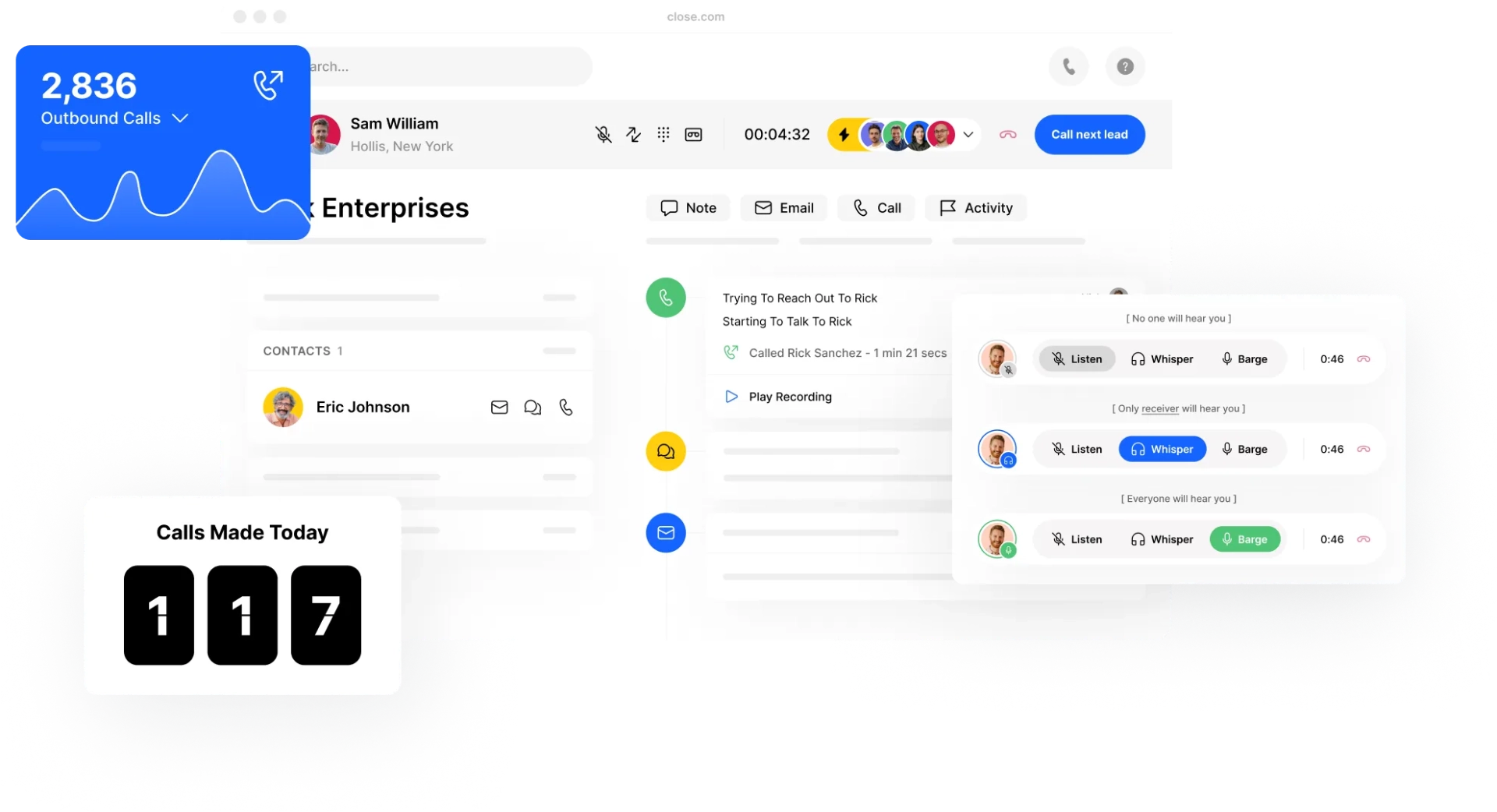
Of course, your team probably doesn’t rely solely on calling. So, look for a system that suits your needs with the communication channels you use most, such as SMS or even video sales calls.
Email Integration
It probably goes without saying that email is integral to every modern sales team. Yet, it’s far too easy for your inbox to get messy and unorganized (we’ve all been there!).
That’s why email integration is so important for a sales management system. That way, your inbox stays clean while your whole team gets the full history of conversations with each lead.
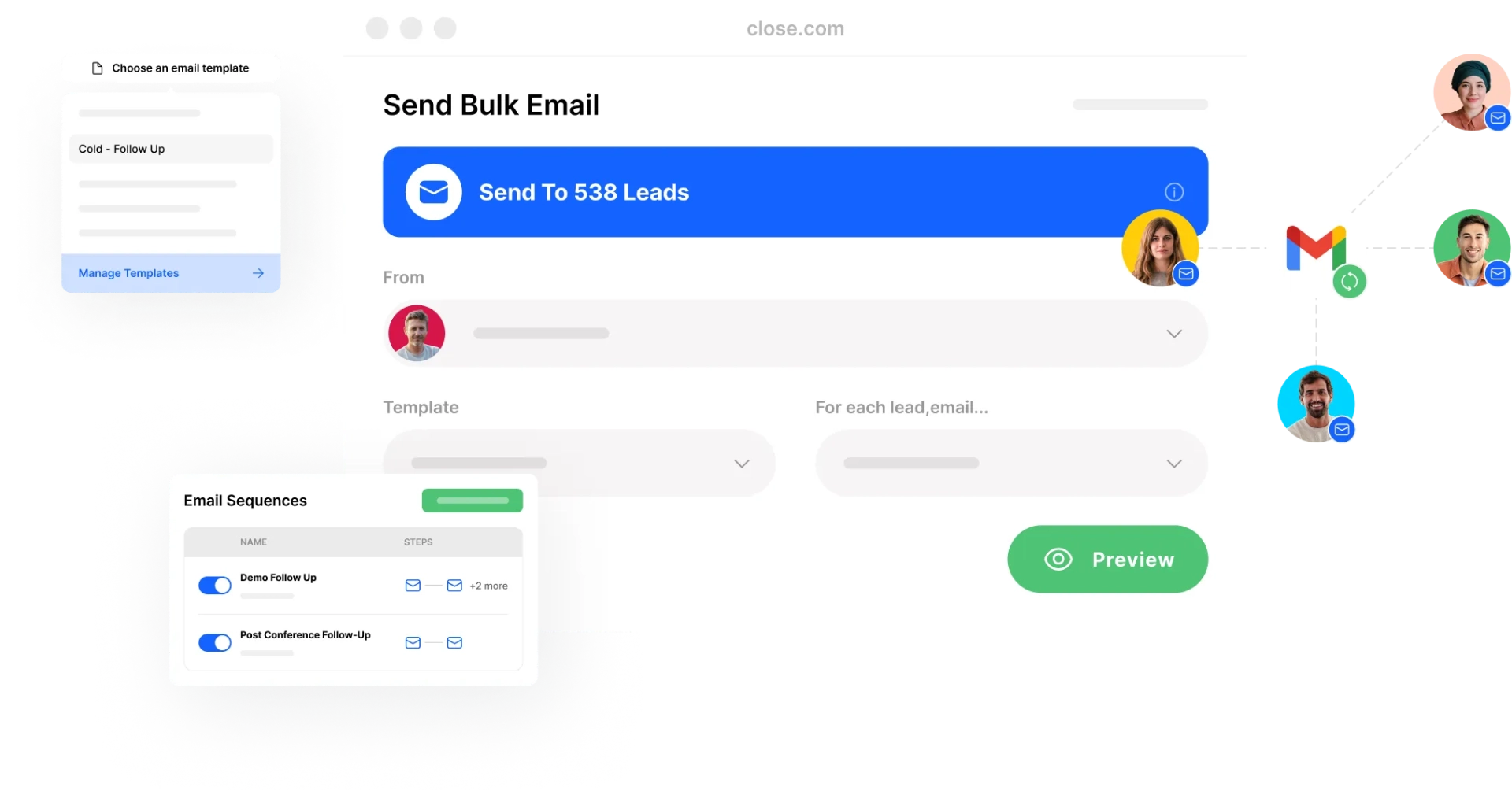
The right email integration should include features like these:
- Two-way inbox syncing
- Customizable templates that can be shared with your team
- Email scheduling
- Follow-up reminders
- HTML
- Undo send
- Bulk email capabilities
Automation
You want your sales team to focus on selling and closing deals, not remembering to send follow-ups or nurture leads. To clear up mental space for the work that matters, sales management software should provide email automation features such as one-click email drip campaigns for nurturing or following up with leads.

Sales Reporting
Smart reporting in your sales management software separates the important details from the noise. This means you get actionable insights into the results of your sales efforts, the health of your pipeline, and how your team is performing.

You should also be able to see reporting on the people you sell to, pulling data about the characteristics that make up your ideal customers. This could include customer lifetime value (LTV), demographics, and sales by region.
However, more isn’t always better when it comes to sales data. When your sales management system is full of data, it’s easy to overcomplicate the matter. To choose the right software, first think about the sales KPIs that have more impact in your sales team, then look for a system that tracks those metrics and helps you turn them into valuable insights, not raw piles of data.
Built-In Coaching
An essential part of managing a sales team is coaching them to be better sellers. So, the right sales management software would include features that help managers coach better.
Along with insights into activity and performance data, as mentioned above, this could also include space to write notes inside certain deals for reps to work on, or call coaching features.
For example, some CRM software for sales management allows managers to join live calls. Normally, this includes the ability to Listen, Whisper, or Barge the call, depending on what the situation calls for.
At the very least, the system you choose should be able to record calls, emails, SMS, and other contact your reps have with leads. That way, you can at least review past touchpoints and base your coaching on real sales interactions.
Fast, Powerful Search
There’s no point in collecting data about your sales and leads if you can’t find it when you need it. Your software should include a powerful search engine that gives you access to the information you need at lightning speeds.

Some systems take this to the next level by allowing you to save those search templates and create automated lists of leads based on the criteria you set (such as Smart Views in Close). This allows you to quickly narrow in on the leads and information you use most.
Customizable to Your Needs
The right sales management software is the one that’s right for you. There’s no one-size-fits-all solution and you should look for a tool that can be customized to work with your sales plan and strategies. This could mean something as complex as a custom setup or as simple as custom fields, templates, and smart views.
Good customization allows you to set up your own unique workflows and custom activities, giving structure to your sales events and adding meaning to the notes your reps take.
The right tool also lets you customize the permissions that each user has to see or edit information, as well as allowing you to export the information you’ve stored there.
Sales Forecasting
Do you know if you’re going to hit your sales target for next month? Your software shouldn’t just tell you what sales have happened but also give insight into what’s going to happen. Sales forecasting is especially important for sales directors and executives who want to forecast future sales and define company-wide goals. Be sure to pick up our free sales forecast template if you're just getting started today.

Sales Leaderboards
Sales leaderboards enable both reps and managers to track their performance against both goals and other team members. They help sales teams quickly identify top performers and opportunities for improvement. Rather than having to wait until the end of the month, or even (yikes!) the end of the quarter, the numbers are always in plain sight.
Fast, Easy Setup
The whole point of using sales management software is to speed up your sales team. The tool you choose should be easy to set up and not require months of downtime just to train your team on it.
Integrations with Other Business Tools
As a sales team, you integrate with all other parts of your company from marketing to product to support tools like Zendesk or similar alternatives. And your software should do the same. Sales management software should be able to easily capture and collect the information you need from the rest of your company’s software stack.
Easy integrations with other tools allows you to set up custom reporting, generate automated email digests, send notifications and alerts through Slack, or trigger other custom workflows that save your team time.
Easily Accessible Support
No software is bug-free. And whether you’re dealing with a product flaw or human error, your software needs to provide the support to get you back selling with minimal downtime. If you’re wondering how the support works with a certain software, get in contact with their sales team, or check out reviews from real customers on sites like G2.
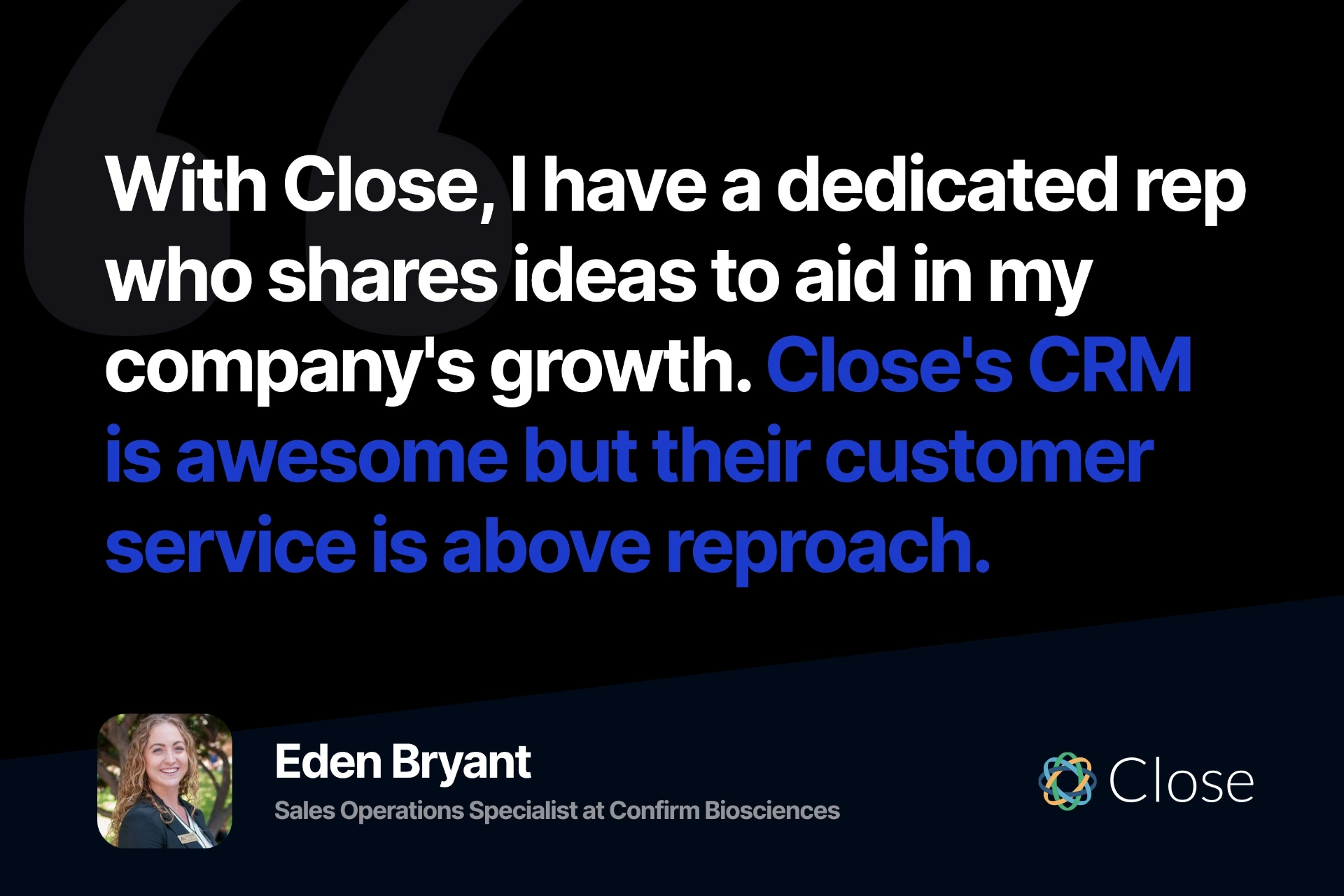
Free Trial
Choosing sales management software for your company is a big commitment. And you shouldn’t have to go into it blindly. Pretty much every legitimate option offers some form of free trial that lets you try before you buy. If not, it’s a pretty big red flag that you’re not going to get what’s promised.
Want to try Close with your own team? Sign up for a free 14-day trial.
Affordability
Choosing a sales management software solution isn’t just about features and benefits, but also cost. While it’s true that you get what you pay for, some sales management software use complex pricing structures that can quickly break your budget. Make sure you look for pricing that is transparent and clear so you know what you’re signing up for.
9 Reasons Why Sales Management Software is Essential to Every Sales Team
In today’s fast-paced sales environment, using sales management software to empower your team is no longer optional. The competition is too high and potential clients have too many options for you to get caught flat-footed or unorganized when a lead comes in.
While we’ve already mentioned a few of the benefits of sales management software, there are many more examples of just why this type of tool is so essential to every person on your sales team.
Organization: Keep All Your Leads, Prospects, and Opportunities in One Place
According to the CMO Council, lost productivity and poorly managed leads cost companies at least $1 trillion every year.
Being organized is an underrated selling superpower. The easier it is for your sales reps to store and find the information they need—such as lead contact info and history, sales pipeline stats, daily schedule, etc.—the more time they can spend actually selling.
Whether you’ve got 10 or 10,000 customers, your sales management software has to empower you to stay organized, manage your leads, and stay current with your sales pipeline. For example, pairing Close’s CRM with its powerful internal search engine allows you to find lead information, narrow down prospects by specific criteria, or jump to a customizable view of your pipeline in seconds.
Why this is important: Sales are won with relationships. And the foundation of every great sales team is an organized system for tracking, engaging with, and following up with leads.
What you're missing without it: It’s impossible to run an efficient sales team if you’re spending all your time searching through unorganized customer notes, chasing down contact info, or wondering about the state of your sales pipeline.
Efficiency: Track Prospects as They Move Through Your Sales Funnel
Your customers don’t care that you’re juggling 78 new conversations, 24 product demos, and 131 responses to a cold email campaign every single day. In order to maximize the return on time invested with each prospect, you need a smooth process and workflow for tracking them from lead to opportunity to customer.
Sales management software gives you a full view of your relationship with each lead so you can treat them like they’re the only person in the world. Keep all your sales activities in one place so you don’t miss a call, email, text, or task. Track every individual touchpoint to see when you should follow-up or change your sales strategy. Or organize leads in your pipeline by value and the likelihood they’ll close to make sure your efforts are bringing in the biggest return.

Why this is important: Once a prospect is in your funnel, they’re yours to lose. Don’t waste all the time you put into finding and qualifying them simply because you didn’t have the right tools in place.
What you're missing without it: Every sales funnel has room for improvement. But without tracking leads inside your pipeline, you have no insight into how you can improve, grow, and continue to automate your sales process.
Performance: Monitor and Support Your Sales Reps to Do Their Best Work
Your sales team is only as good as the players on it. And as their manager, it’s up to you to ensure they’re doing their best. Sales management software gives you an overview of your team’s productivity so you can track individual performance, identify issues, and even perform live call coaching that enables them to improve in the moment.
And this knowledge isn’t just for you. Individual sales reps can use the performance metrics in their software to inform their own sales strategies and also check the team leaderboard to see how they stack up against their co-workers.

Why this is important: As a sales leader, you can’t just rely on your gut. By monitoring and tracking the data from your team’s sales activities and performance, you’re in a much better position to adjust strategies and make smarter decisions for everyone.
What you're missing without it: You can’t guide your team if you don’t know what their strengths and weaknesses are. Without gaining transparency into your team’s performance and productivity, you miss valuable moments for teaching and coaching them.
Automation: Scale Up Your Sales Efforts With Automated Communication and Follow-Ups
The right sales management software speeds your team up in a number of ways. One of the most powerful of which is through automation. In fact, according to Velocify, high-performing companies are twice as likely as underperforming companies to describe their sales processes as automated.
Sales management software can reduce the time spent on manual outreach and follow-ups so you can focus more on actually selling. For example, Close’s Power Dialer can double your team’s outbound call volume by automatically working through a list of leads right from your CRM (so you always know who you’re talking to and have all their info in front of you).
Why this is important: Whether you’re sending follow-up emails, setting up drip sequences, or calling prospects, the more volume you can do in a day, the more sales you’ll bring in.
What you're missing without it: If you’re not getting to your leads in a timely manner, someone else will. Without sales automation, you’re potentially losing out on 60% of the leads you bring in.
Reporting: Track Sales KPIs, Forecast Sales, and Monitor Your Team’s Performance
You can’t hit your goals, grow your revenue, or build the best sales team possible if you don’t have data to back up your decisions. Sales management software provides you with the insights and metrics you need to set and hit your sales KPIs. Whether this means your monthly sales growth, pipeline status, or sales rep productivity.
But unlike revenue, more isn’t always better when it comes to reporting sales data. And simply having software that spits out a ton of data or provides every report imaginable can do more harm than good.
Why this is important: Reporting shows you the health of your team so you can make better decisions and perfect your sales strategy. Having the right sales data also makes it easier to get buy-in from key stakeholders on your strategies and plans.
What you're missing without it: Building a sales strategy without reporting is like walking into the forest without a map. You have nothing to help set you in the right direction or bring you back on track when you get lost.
Outreach: Build Better Relationships With Your Customers Through Email, Calls, and Text
It’s a simple fact that the more prospects you talk to, the more sales you’ll convert. However, 68 percent of companies say they regularly struggle with lead generation.
Sales tracking software makes it easier to stay in touch with your prospects, leads, and customers. By integrating your emailing, calling, and texting with your other sales tools (like a CRM), your reps are in a much better situation to track their sales activities and close more deals.
Why this is important: Your customers expect a seamless and enjoyable experience when you contact them, which can only happen when you combine your sales and outreach tools.
What you're missing without it: There are just too many opportunities for errors when you’re constantly switching back and forth between emails or your phone and your CRM and other sales tools.
Integration: Connect Your Sales Efforts to the Other Tools You Use to Run Your Business
You use a wide range of tools to run your business. And to be as efficient as possible, those tools need to work together. With sales management software that integrates your support platform, email marketing software like Mailchimp or ActiveCampaign, everyone stays on the same page.
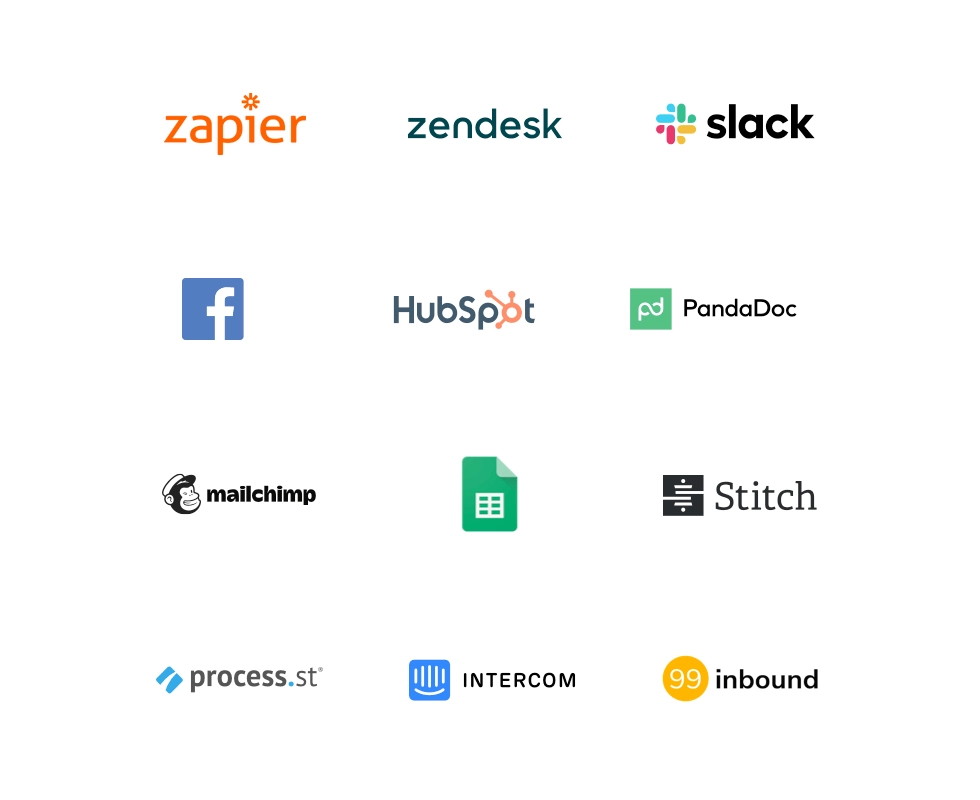
Why this is important: Everyone is more efficient, informed, and productive when your company’s tech stack works together.
What you're missing without it: Not being able to integrate your sales management software with your other tools means losing time and efficiency as well as valuable knowledge from other teams and departments.
Focus: Reduce the Noise That Distracts Your Team From What Really Matters
There are far too many things competing for your sales team’s attention every single day. Sales management software provides everything they need in one place so they can focus on what’s most important: closing deals.
For example, many people want social media marketing features integrated into their sales management software, which sounds good in theory. After all, your customers have social media accounts, so why not connect with them there? However, the activity that still brings the most value is actually talking to prospects and engaging in meaningful sales conversations—not replying to their tweets.
Why this is important: Focus and efficiency compound your sales efforts. The more your sales management software defaults to only showing sales activities of greater value, the better.
What you're missing without it: Your sales reps could spend time in all sorts of ways. And without a way to focus their efforts, they’re more likely to spend them on low-value or time-wasting activities.
Planning: Uncover Trends, Increase Repeat Selling, and Update Your Sales Plan
Are you going to hit your sales quota this month? Where do your most valuable customers come from? How long does it normally take for prospects to go from outreach to conversion? These are the questions sales management software needs to answer if you want to plan your company’s growth.
Beyond just reporting what happened in the past, your software should give a glimpse into the future. This could include forecasting sales, looking for trends in your prospects, or updating your sales plan.
Why this is important: Everything from your sales plans to your company goals starts with insights into sales. By having the tools to make a better plan, you put everyone on the same page and can build real momentum.
What you're missing without it: Much like the other reporting features, not being able to plan and forecast sales leave you directionless, blindfolded, and otherwise unable to make smart decisions.
Forget Feature Envy and Focus on the Sales Management Software That’s Right for You
In the end, choosing the right sales management software depends on one thing: what’s right for you?
The best option for your team is the one that keeps you organized, focused, and productive. Not the one with the most tabs, reports, and drop-down menus.
As you compare tools, make sure to look past all the bells and whistles and ask what they’re really doing. Is this tool made for you? Will it work seamlessly with your sales plan and team structure? If not, look for something that does.
You and your sales team will be using this tool every single day. So take the time to make sure you’re committing to one you feel at home with.
Want to give one of the top CRM software for sales management a spin? Try Close for 14 days, without cost or commitment.








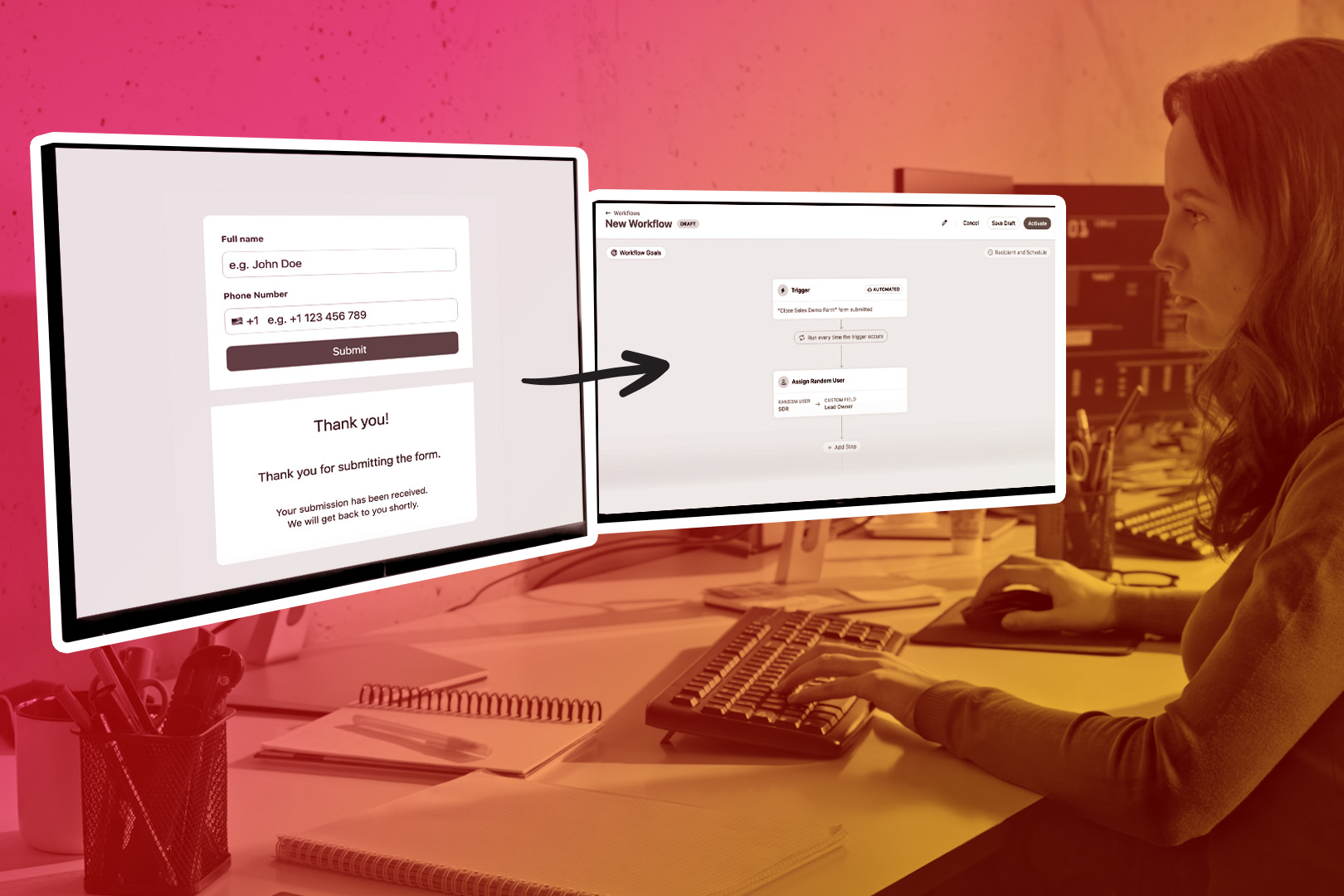

.jpg)

